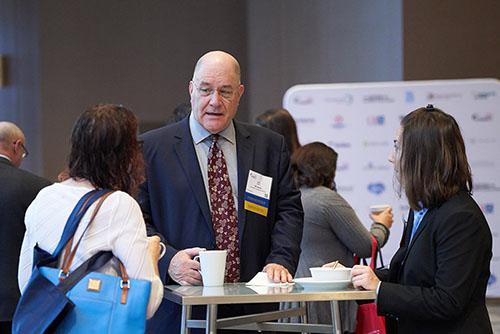Brands Taking Stands | Looking Back, Moving Forward
Brands Taking Stands™ Newsletter | October 24, 2018
THE BIG STORY
Looking Back, Moving Forward
What a difference a year makes.
Last October, 3BL Media presented its first “Brands Taking Stands” conference. Earlier in the year, we had acquired the company that had previously owned and operated the event as Commit!Forum. The renaming and reorientation of the 10-year-old conference spoke to our sense of a need for a deeper dive into the “commit” concept as it applied to corporate social responsibility in business.
The Brands Taking Stands theme was inspired by a more sharply pointed phenomenon that I had been reporting on for two years previously: The growing number of companies announcing principled positions, both individually and collectively, on major social and political issues. This unprecedented outpouring of pushback against public policy by the private sector began in 2015 with legislation labeled as “bathroom” and “religious freedom” bills in North Carolina, Indiana, and Arkansas. Thousands of businesses and organizations spoke out against these misguided policies.
Since the inauguration of the current administration, the Brands Taking Stands movement (for a movement it clearly is—not just a trend) has grown exponentially. Coalitions of companies now regularly sign on to collective statements about the Big Issues,acknowledging the daunting challenges and proposing innovative solutions.
Our instinct to point the conference in this direction was on target. On the first day of last year’s “business” gathering, the major topics included immigration policy, gun control, and the opioid crisis—and that was before the lunch break. The event was definitely not a business as usual gathering.
This year’s “Brands Taking Stands: The Long View” doubles down on the theme, exploring the latest developments in those companies taking positions on the key social and political issues of the day—and in their actions to make progressive change. One year down the road, more companies are finding new ways to deal the ongoing issues, and we’re in the middle of the action. Now, the public statements made by companies and organizations on several policy issues are mirrored by the variety of internal strategies and practices being put into place to address them. Diversity and inclusion, sustainable supply chains, governance, reputational management—the basic building blocks of corporations are being re-shaped by adding principles to the operations of HR, IR, and communications departments.
NEWS YOU CAN USE
Using Senior Leadership to Support Women in the Workplace
“People want their voice heard and valued, and they want a choice in how they decide to be engaged,” says Rachel Hutchisson, vice president, corporate citizenship and philanthropy, at Blackbaud. As women comprise approximately 50 percent of the cloud software company’s more than 3,000 employees, it only made sense to empower the company’s women through its Senior Women’s Leadership Council. “Senior leadership can empower, and be a real positive force in engaging employees and giving voice to diversity,” Hutchisson told TriplePundit.
The Council was launched earlier this year to expand Blackbaud’s commitment to the women’s leadership community and as an investment in the future of the company. “In the end, we are seeking not only to help build women leaders, we are seeking to continually enhance our culture and to help Blackbaud be the best it can be,” Hutchisson told writer Megan Amrich. The company joins the many who now understand that supporting its female workforce from the top down is a powerful statement about its commitment to diversity and to the profitable health of the company.
Creating Sustainable Supply Chains: The Devil’s Details
Say “sustainable supply chain” today and you’ll get a nod of general agreement: “Good idea!” But drill down to the myriad details of different industries, and that easy assent can suddenly become a wide-eyed stare as the many and complex components of a specific sector’s supply chain—and how they are intertwined—become apparent. If the devil is in the details, well, so be it. Mastering the intricacies of a given industry’s operations is what it will take to make change in this most important area of business practice.
Three examples illustrate the issue.
Bacardi, the spirits company, learned that sustainability in packaging is about more than weight when when it set out to reduce packaging by 10% between 2008 and 2017—and came up short with only a 4% reduction. The company cites two reasons for the shortfall: new packaging design implications and a refocus to overall GHG emissions impact. A key learning was that a holistic approach may result in more modest achievements in any one area, but that the ultimate goal will have a much larger impact.
ESG Investment Driven by Millennials, Women
“Momentum for ESG disclosure and investment has arguably never been higher.” That’s the conclusion of a recent article published on TriplePundit. “While the mainstream investment sector still shows some skepticism, resistance to incorporating ESG factors into investment decision-making is decreasing,” writes author Amy Brown, citing the third annual Responsible Investing Survey by RBC Global Asset Management. “For the first time, and by nearly every measure, institutional investors and consultants have shifted decisively from asking whether to adopt ESG principles, to looking at how to implement them,” explains Brown.
C-SUITE COMMENTS
“In a life of a CEO there is a lot going on, nice things and moments and less desirable ones.
Sometimes, situations develop in such a way that no one can win, where every option is wrong. The so-called “Khashoggi crisis,” the death of Jamal Khashoggi, is such a situation.
As soon as I heard of his death, it was clear to me that we couldn’t simply move on and do business as usual.
But what should the response of the CEO of a global company be?
I've taken my time deciding whether or not to attend the Future Investment Initiative in Riyadh in 2018. I wanted to consider the interests of all stakeholders, the purpose and reputation of our company, our trusted partnership with customers in the Kingdom and the Arabic world, a business opportunity worth up to US$30 billion dollars by 2030 and, last but not least, thousands of jobs in the Kingdom as well as elsewhere in the world.
The expectations placed on CEOs are high. Customers trust us to deliver what we promise, employees rely on us to protect their jobs, national governments want us to put their own countries first, sometimes confusing "my country first" with "my country only," and shareholders demand decent and at least industry-leading value creation.
I will not attend the FII 2018.
It’s not a decision against the Kingdom or its people – it’s a decision based on how much responsibility one can assume at one time. Siemens has been a reliable partner to Saudi Arabia for decades and supports its great Vision 2030. But for now, the truth must be found and justice must be served. Going forward, this should be the underlying principle in developing the Kingdom for the greater good of its people and the whole region.
I do hope there will be clarity, transparency, and justice sooner rather than later. It's in the best interest of the whole world for leaders to engage in dialogue. History shows that when things are complicated, the better option is to talk with each other rather than about each other. The latter never produces good results.”
—Joe Kaeser, president and CEO, Siemens
Excerpted from “A Decision to Make—and What Really Matters.”
PEOPLE ON THE MOVE
Davion Ford was named global communications manager – sustainability for Arcadis N.V. in Amsterdam, Netherlands. Ford had been senior communications manager at the Global Reporting Initiative (GRI).
MetLife named Tim Ring, currently senior vice president, associate general counsel, and chief of operations for legal affairs, to the newly created role of chief sustainability officer. In his new position, Ring will oversee MetLife’s corporate responsibility initiatives. To support this effort, MetLife is forming a new sustainability function that will report to Ring. It will include MetLife Foundation, headed by Vice President Dennis White, as well as the company’s reputation management team led by Vice President Jon Richter, which produces MetLife’s annual corporate responsibility report and oversees all policy-focused thought leadership.
Helen Sahi has joined Unifi as VP of global corporate sustainability. Her prior roles included positions at Avery Dennison Corporation and Bank of America.





